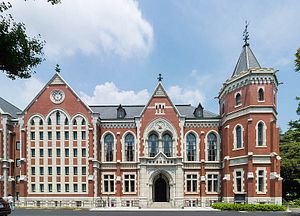After a series of sexual assaults against female university students, student groups in Japan are pressuring universities to take more action to prevent sexual violence and deliver a safe student environment.
Sexual harassment during job hunting and sexual assaults taking place at club activities are typically treated by universities as a personal problem rather than a structural issue affecting student well-being. A Japanese Ministry of Education survey of 1,091 universities in 2018 revealed that only 55 universities answered they had been contacted by students concerned about sexual harassment in job hunting.
“Job hunting” refers to the recruitment schedule of major corporations targeting final year college students. The selection process is fierce as students compete to snag a graduate position with a guarantee of lifetime employment. Students are encouraged to leverage alumni contacts in the hope of getting a head start. But female students can fall prey to male employees who take advantage of students eager to seek career advice. Some feel pressure to comply with the extra attention out of fear of having their applications binned.
Currently, the law obliges companies to take measures to prevent sexual harassment in the workplace, with specific initiatives offered by a Ministry of Labor guidebook. But the recommendations remain nonbinding and don’t cover students during recruitment selection rounds.
Although the Ministry of Labor is considering expanding the guidelines to cover students, the effect may be limited. According to a survey taken by the Ministry of Labor in 2017, 35 percent of big companies who responded said they did not take any of the countermeasures listed in the guidelines, such as setting up sexual harassment consultation desks.
A questionnaire by Business Insider Japan revealed that 50 percent of the 236 women interviewed experienced sexual harassment while job hunting. Of that number, 70 percent responded they had no one on campus to consult about the issue.
A grassroots organization called “Chabudai Gaeshi Joshi Action” (translated as “Turn over the table ladies”) is leading a petition to step up the level of action taken by universities. The group demands educational activities for students on sexual consent and proper outlets for students who currently have nowhere to turn after experiencing sexual harassment.
The group was founded in 2015 after the spread of the global #MeToo movement to urge universities to take responsibility in providing guidance to prevent sexual crimes and lessons in making sexual assault statements both on campus and in the job recruitment process.
A job hunting networking app designed to help students contact alumni is being blamed for putting women at risk. While the scale of the problem is still unknown, recruiters say using apps is becoming a popular method to make connections. In March, Metropolitan Police arrested a male employee from the major trading house Sumitomo on allegations of rape after he invited a student for drinks when she reached out through the app. The man was dismissed and the company offered a public apology and also introduced guidelines minimizing staff contact with job seekers. Another case involved a male employee from construction firm Obayashi Corporation who was arrested in February on sexual assault charges after connecting with a student through the app.
Similarly, one former student described persistent harassment from a male employee from human resources who first offered to correct her resume and then proceeded to ask whether she had a boyfriend and if she enjoyed drinking alcohol. When she refused an invitation to dinner, the harassment escalated to 10 emails a day asking her to go to a hotel together and phone calls late at night.
The problem of sexual harassment and assault is not limited to the job hunting process, however. After continuous excessive drinking and sexual assault arrests involving Japan’s prestigious Keio Universities, a public statement was issued on their homepage in November last year stating it was “regrettable” and they “sincerely hope students behave responsibility as individuals and will encourage students to continue to study hard.” Some students lashed out at the lack of an official stance against sexual violence and concrete measures to prevent similar incidences from happening again.
In June, student groups at Keio University and Sophia University organized a symposium inviting student activists and guest speakers to share proposals on how universities can conduct sex crime prevention and educational activities. Fourth-year Keio student Koyo Tani launched a petition with the support of 300 teaching staff and alumni, collecting 897 signatures to persuade her university to take action. Following the symposium Keio University says they are currently considering countermeasures.













